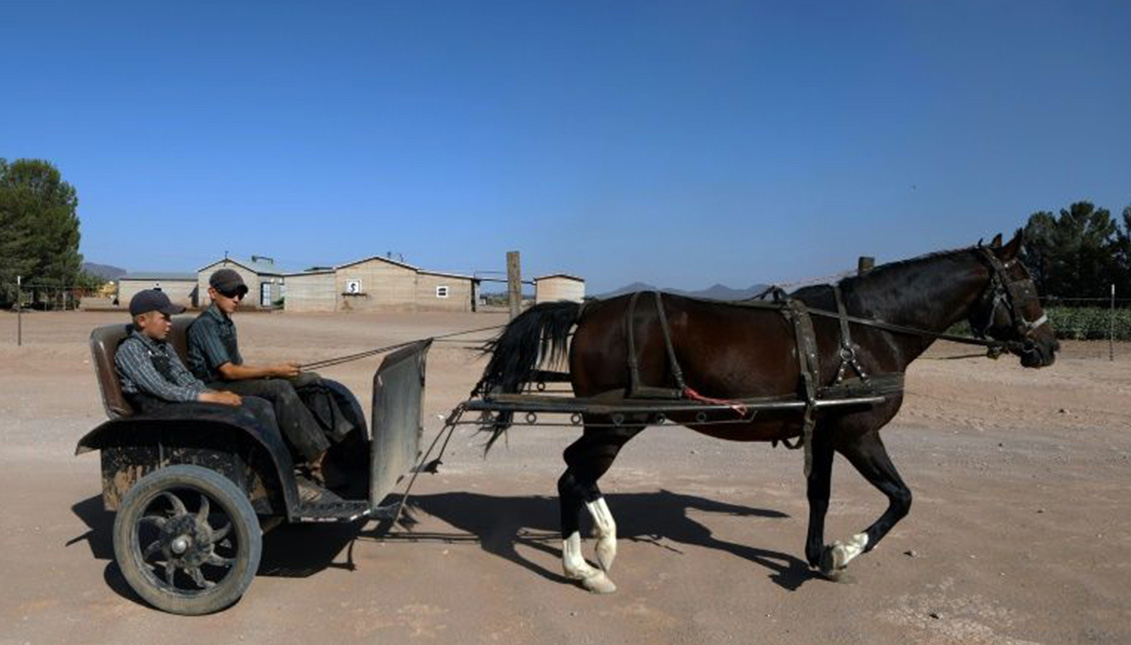
"Television is bad": Mennonite community in Mexico just discovers the COVID pandemic
The arrival of electricity and the Internet in a Mennonite village in Chihuahua has brought more than one unpleasant revelation. How do you isolate someone who…
This story could be a great idea for a movie, but it is totally true and "current," even though it has a community of Mexican Mennonites as its protagonists.
Isolated in the deserts of the northern Mexican state of Chihuahua, the residents of El Sabinal have avoided cell phones, electricity, television and tires with all their might. But even in a place as remote as this, Mennonites cannot escape the scourge of modernity, and as electricity has arrived in village, some of the younger people have succumbed to the temptation of the Internet.
As Herika Martinez reports for AFP, this is how they found out that the COVID-19 pandemic was shaking not only Mexico, but the world.
Now that they know what is happening on the planet, many believe that the virus has also reached the village.
"About 10 people from different families fell ill, although not very seriously," one of his neighbors told AFP.
"They thought it was the flu, but when they went to the pharmacy they were told it was Covid-19."
At the pharmacist's recommendation, the sick people isolated themselves in the house instead of visiting the doctor or getting tested, and they believe that the contagion had to have occurred during one of their visits to neighboring communities to sell their products.
This could sharpen the feeling of some Mennonites that Chihuahua is no longer isolated enough for their way of life, and cause more families to leave El Sabinal for more remote lands.
Something that already happened some time ago, when a hundred families from the village — almost half of its inhabitants — headed for the southeast of the Campeche state as soon as the government began installing the first power lines in the area.
On that occasion, the young people decided to stay because they lacked the resources to buy land in Campeche, as a 21-year-old Mennonite who had recently married and no longer wants to use horse-drawn carts with wooden wheels explained to AFP.
"I do want the wheels. It's wrong for them," he said. "I think it helps us move.
RELATED CONTENT
It's a sign that new times are changing this community that has been anchored to the past, where it is no longer so uncommon to see the odd truck, tractor or even car that runs on engines.
It mirrors the revolution brought with electricity, no matter how intermittently they run.
"They are turning on the electricity, but it is cut off a lot," said another 28-year-old villager and father of three.
However, television is still a 'devilish' technology for both the more conservative and adult population, and for young people.
"Why do we want television? Television is bad. But the tire, yes, because it helps us move quickly," said a Mennonite.
In the state of Chihuahua — especially in Ciudad Cuauhtémoc — there are currently about 100,000 Mennonites, one of the largest and most flourishing communities in the country.
The Anabaptist collective left Russia at the end of the 19th century to settle in Canada and arrived in Mexico in 1922, bringing all their belongings, including farm animals and even seeds, in six trains. They were looking for a more fertile and peaceful land where they could continue their lifestyle. In more or less recent times, they have encountered problems.
The difficulty of surviving in an increasingly global environment is one of them, but they have also been victims of the violence that is shaking the country and in 2008, forced the Mennonite merchants of Ciudad Cuauhtémoc to close their businesses and put up signs denouncing the insecurity they were experiencing.
Also in late 2019, the nine members of a Mennonite family of North American origin were shot dead in a dispute between cartels.











LEAVE A COMMENT: